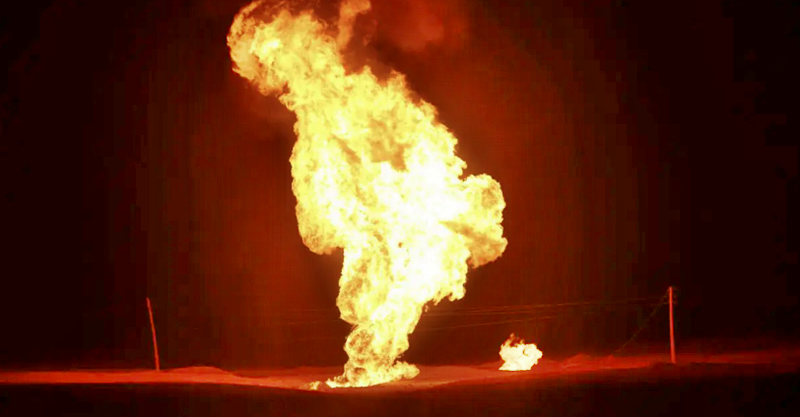Israel Continues Attacks Against Iran In A Bid To Escalate Regional Conflict

By Vagabond - Robert Inlakesh - February 21, 2024
Israel has been conducting a clandestine war against Iran for years, violating the sovereignty of numerous foreign nations and even carrying out attacks on Iranian soil.
While Tehran had been responding in its fashion, since the beginning of the Israel-Gaza war the scale and number of the attacks have increased, the latest coming against civilian infrastructure inside Iran. This appears to be a desperate attempt to escalate tensions and drag the United States into a wider West Asia war.
Described by the Iranian government as acts of “terrorism and sabotage”, two explosions occurred on February 14, targeting gas pipelines that are used to supply heating and supplement the commercial needs of millions of Iranians. Only days later, after much speculation arose as to who was behind the targeting of Iran’s civilian infrastructure, The New York Times published a report, that cited two unnamed US officials and an alleged Islamic Revolutionary Guard Corps (IRGC) affiliated strategist, accusing the Israeli Mossad of culpability.
In late January, the Israeli Air Force carried out the most severe attack in years on Syria’s Capital city, Damascus, killing at least 5 members of Iran’s IRGC and two Syrian Arab Army soldiers. The airstrikes on the heavily populated Syrian Mezzeh neighborhood also reportedly inflicted civilian casualties and at the time constituted a significant leap in the severity of the attacks on Iranian targets in the region. This came following an Iranian response to another strike that killed a high-ranking IRGC official, Razi Mousavi, in Damascus also.
Mousavi was assassinated in December, which caused uproar inside Iran and led to a vow of revenge. A deadly terrorist attack on January 3 in the city of Kerman, which killed roughly 100 and injured upwards of 200 civilians, also merited a “self-defense” attack by Iran. Although the terrorist attack, conducted by two suicide bombers, was officially claimed by Daesh, there were still allegations that Mossad was involved and many Iranian commentators had pointed out holes in the Daesh claims.
Less than a week before the murder of 5 more Iranians in Damascus, came the IRGC’s dual response to the Damascus and Kerman attacks. Iran launched a multi-pronged attack that flattened an Israeli Mossad building, allegedly their headquarters in northern Iraq, while also launching missile strikes on Syria’s Idlib province; at a distance roughly the same as it would take to hit Tel Aviv from Iran.
What is important to now keep in mind is that Iran has been again attacked by Israel on its soil, according to the report released by The New York Times. It is well known that in the past various sabotage attacks have been committed on Iranian soil, carried out by the Israeli Mossad, the most notable being the assassination of Iran’s top nuclear scientist, Mohsen Fakhrizadeh, who was killed by a remote-controlled gun in Tehran back in 2020. In the case of the 2020 assassination, there was no known retaliation from Iran.
While it could appear and has been argued by some analysts, that Israel has a vast intelligence web operating inside Damascus that is giving away the locations of IRGC members, the reality is that all the locations Israel has been striking are publicly known. The Iranians are official guests inside Syria and their whereabouts (along with the destinations of residence) are quite well known and are rarely hidden.
According to a Syrian source, with intimate knowledge of the security situation inside the country, while the South of the country (around Qunietra and Suwayda) is known for having a gang, corruption, and spy problem, the same issue does not exist in Damascus.
Regardless, the escalation in attacks against Iranian nationals and the civilian infrastructure inside of Iran is indicative of an Israeli attempt to drag the entire region into a broader conflict; one which will likely necessitate the direct involvement of the US military.
Despite the US’ escalatory strikes on Iraqi and Syrian soil, killing tens of Iraqi security personnel and Syrian nationals, including high-ranking members of Iraq’s Popular Mobilization Units (PMU), the strikes on US forces by the Iraqi groups have all but ceased. This has occurred at a time when there are allegedly meaningful discussions taking place over the possibility of a US withdrawal from both Iraq and Syria.
The fact that the Iraqi groups have been capable of holding their fire demonstrates their pragmatic character at such a time. Yet, as this occurs, it appears that the Israeli government, headed by its Prime Minister Benjamin Netanyahu, is poised to reignite tensions in a bid to escalate their war on Gaza onto several other fronts.
While Tel Aviv has no means of fighting a multi-front confrontation and is failing to achieve its stated military objectives in Gaza, it can only be assumed at this point that the attacks aimed toward Iran are a desperate bid to drag the region into a broader confrontation that will involve the US military
